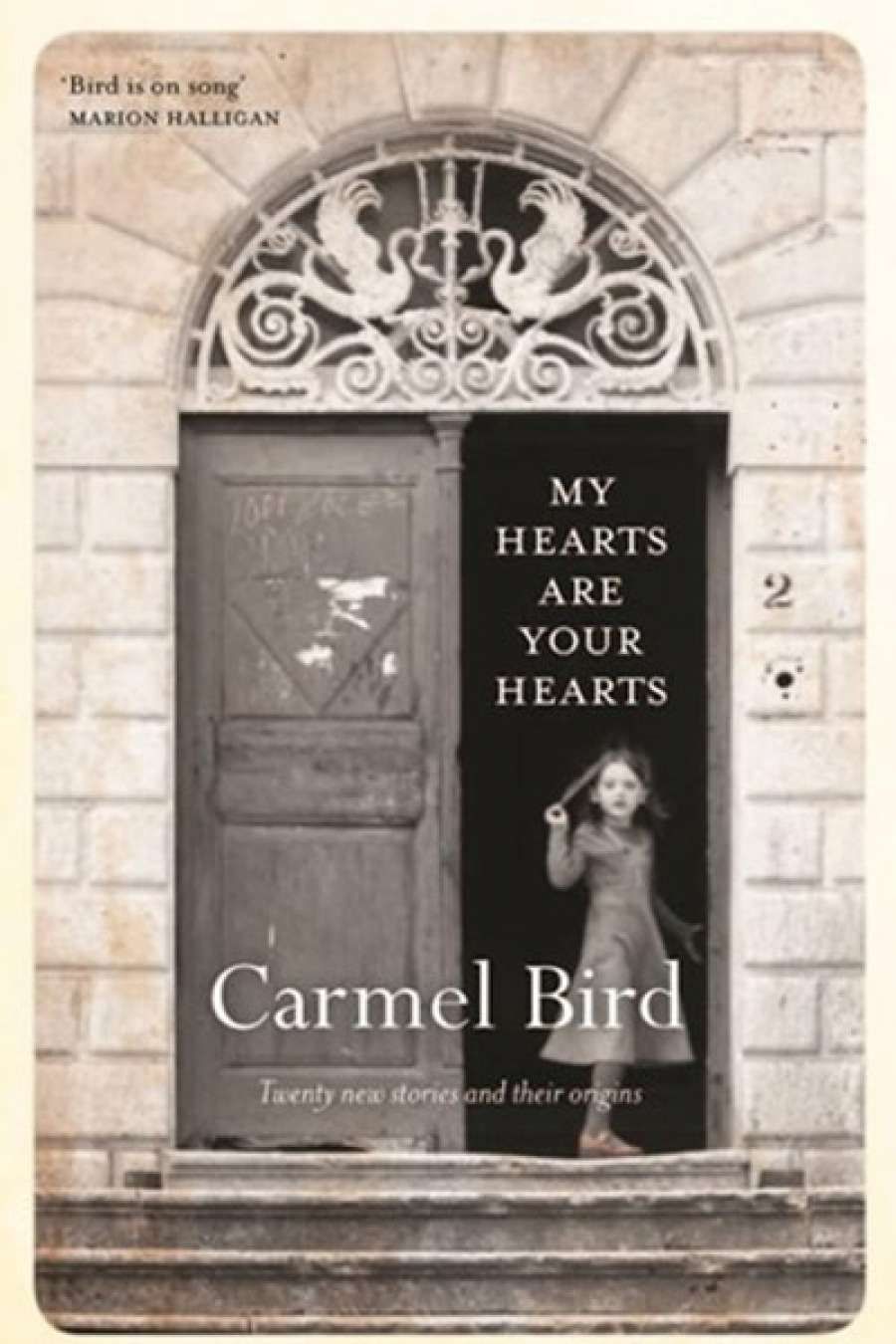
- Free Article: No
- Contents Category: Fiction
- Custom Article Title: Susan Midalia reviews 'My Hearts Are Your Hearts' by Carmel Bird
- Book 1 Title: My Hearts Are Your Hearts
- Book 1 Biblio: Spineless Wonders, $27.99 pb, 228 pp, 9781925052213
Of course, it is not that simple. Though the stories are often characterised by a lightness of touch – the use of wry humour, arch asides to the reader, and a flat, affectless tone of voice, as though the whole damned mess of existence is being observed at a knowing remove – we are always conscious that for Bird questions of morality, ethics, and power genuinely matter. These are stories about the desires and fears at the heart of relationships and communities explored over a wide range of subjects, including a young woman selling toothpaste door-to-door, marriage breakdowns, the ambivalent lessons of history, opportunities for women, art, landscape, sexuality, education, social class, and organ transplants, as well as Bird’s beloved Tasmania as a site of both beauty and darkness. The combination of seeming lightness and moral seriousness is evident in one of my favourite stories in the collection, ‘Monkey Business’. It begins with satirical digs at the extravagance of a child’s birthday party, where an increasingly bewildered monkey is required to perform for an affluent, morally obtuse audience: ‘Cute! Cute!’ is the narrator’s mocking refrain. Gradually, cleverly, the story widens its scope to reveal the damage done to a child and a marriage, and to expose a heartless culture that often denies the integrity and dignity of both humans and animals. Other stories gain their emotional and moral force by unsettling a calm narrative voice. In the ‘The Legacy of Rita Marquand’, for example, a matter-of-fact tone is disrupted by the use of a disturbing metaphor. The moment occurs when a young Catholic woman, Dolores, entangled in the forbidden world of sexuality, dreads having to divulge ‘toads of truth in the dark box of the confessional’. That single, confronting metaphor suggests both the ugliness of a punitive religious creed and, in its eruption into the narrative, an enactment of the sometimes hidden but nonetheless pervasive power of the church.
 Carmel Bird
Carmel Bird
If important moral questions give coherence to the collection – not that a collection of stories is obliged to be thematically cohesive – I am also drawn to the unexpectedness of many of the stories, which often meander, digress, circle, or elide as a means of enacting the arbitrariness of life. The narrator of ‘From Paradise to Wonderland’ claims that she’s ‘here to tell you that sometimes it’s the destination that matters, and you can stick the journey up your jumper’, but she ultimately enjoys revealing the surprises of the trip and its unexpected ending. By contrast, the ‘destination’ of the story ‘Waiting to be Seated’ evokes the horror of a particular historical event. You will have to read it to find out how Bird ‘flourishes’ this poignant conjurer’s trick.
‘Bird clearly hasn’t lost her enthusiasm and sense of wonder as she enters the imaginative world of fiction’
The stories are also linked by their refusal to lecture or pontificate. Like all good storytellers, Bird gives us the pleasure and the challenge of working out possible meanings for ourselves. The standout example for me of this suspension of judgement is the formally ambitious tale ‘My Beloved Is Mine and I Am His’, which deals with the damage caused to a young victim of sexual abuse. Bird writes in the relevant essay that she was shocked by what she had written. The story certainly shocked me, not because of the moral panic often generated by this subject, but because of its altogether more discomfiting conclusion. Like many of the stories in the collection, ‘My Beloved Is Mine and I Am His’ should be read with an open mind and a generous heart. To this end – the complication of human experience – the stories sometimes debunk the wish-fulfilment fantasies assumed in the fairy tale genre. As the narrator of the story ‘Back to the Womb’ slyly reminds us, ‘That’s not a happy ending, is it?’ But whether the underlying vision of the stories in My Hearts Are Your Hearts is amused, acerbic, wistful, or tender, all of them are thoroughly engaging. That is both a confirmation of Bird’s disarmingly modest statement of intention and a remarkable aesthetic achievement. Fifteen of these stories have already been published, and it is a pleasure to have them gathered in one book, to enjoy what Bird insists, with unabashed sentiment, are tales that have arisen from ‘the core’ of her writer’s heart.


Comments powered by CComment